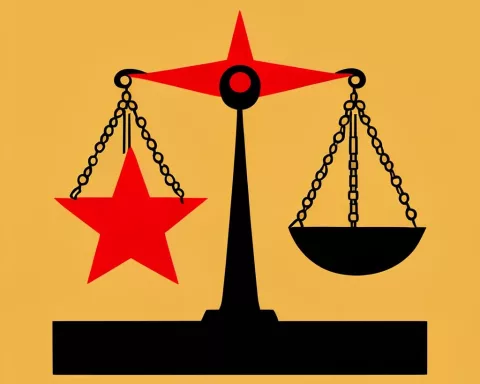South Africa and Singapore have maintained a strong relationship for 30 years, marked by mutual respect and cooperation. Despite global challenges such as the COVID-19 pandemic, both nations have remained committed to each other. Their shared belief in the power of unity and cooperation, as well as their commitment to sustainable practices and economic equality, serve as a shining example of resilience and lasting friendship in the face of adversity. As they navigate the landscape of geopolitical inequality, technological amalgamation, and environmental crises, South Africa and Singapore emerge as shining exemplars of resilience and adaptation, striving towards shared prosperity and growth.
“Learn about the admirable 30-year diplomatic journey between South Africa and Singapore. From their evolution of relations to their shared beliefs, discover how these two nations have maintained a strong relationship and commitment to each other, even during global challenges like the COVID-19 pandemic. Their mutual respect and cooperation serve as a shining example of resilience, innovation, and lasting friendship in the face of adversity.”
Three Decades of Harmony and Collaboration
In the vibrant corridors of the Lee Kuan Yew School of Public Policy in Singapore, a significant event unfolded. The Deputy President of the Republic of South Africa, His Excellency Shipokosa Paulus Mashatile, appeared in front of an assembled crowd, eager to present a public lecture marking three decades of diplomatic ties between South Africa and Singapore.
This event was not merely a celebration. It underlined the reciprocal admiration, strategic alliance, and cooperation that the two nations have nurtured over thirty years. The lecture served not only as an homage to this diplomatic alliance but also as an acknowledgement of the centennial of the remarkable legacy of one of our era’s most influential leaders, Mr. Lee Kuan Yew.
Under the roof of the distinguished school named after Singapore’s founding Prime Minister, Mashatile praised Lee’s devotion to his homeland. Lee’s relentless zeal for constructing a unified and honored nation, free from deprivation and ignorance, directed Singapore on its journey towards becoming an icon for exceptional governance, efficiency, and economic prosperity.
The Dawn of Diplomacy and Evolution of Relations
This intercontinental camaraderie was born in a world starkly different from our current one. In 1992, following years of global seclusion due to South Africa’s apartheid and the progressive advances achieved through peaceful discourse, former Singapore Prime Minister Lee Kuan Yew paid a visit to South Africa. This historic event marked the commencement of a friendship and diplomatic bond between the two nations.
Over time, this relationship has been strengthened through high-level interactions and diversified cooperation in domains like trade, investment, and education. Despite worldwide challenges, including the recent COVID-19 pandemic, both administrations have maintained their commitment to each other.
The Deputy President’s lecture was a testament to the evolution and potential of this bilateral relationship. He underlined the importance of the partnership in addressing domestic challenges such as corruption, ineffective governance, and lack of accountability. For instance, building state capacity requires strategic, organizational, and technical capacity—an area in which South Africa and Singapore have successfully collaborated.
A Robust Relationship and Shared Beliefs
Currently, South Africa and Singapore boast a strong relationship, promoting trade, nurturing people-to-people relations, and cooperating in multilateral institutions. Their bilateral relations are anchored by shared developmental objectives, a commitment to stellar governance, and mutual respect.
The essence of their relationship lies in a mutual belief in the power of unity and cooperation. Despite escalating global inequality and the rapid urbanization of the world, the two nations have strived towards mitigating global inequality and championing economic equality.
The Deputy President underscored the significance of climate change and the urgency of adopting sustainable practices. He applauded Singapore for embracing the Singapore Green Plan 2030, a blueprint for mitigating and adapting to climate change. The incorporation of urban agriculture as a crucial aspect of developing a thriving and resilient city is a testament to Singapore’s dedication to sustainability.
Future Prospects and Shared Commitment
As they traverse the landscape of geopolitical inequality, technological amalgamation, and environmental crises, South Africa and Singapore emerge as shining exemplars of resilience and adaptation, striving towards shared prosperity and growth.
The Deputy President’s visit to Singapore, commemorating the 30th anniversary of diplomatic relations, is a confirmation of a shared commitment to the future. The mutual respect and cooperation between the two nations aptly mirror the shared values of the countries. These values have been moulded and guided by the legacies of their great leaders – Lee Kuan Yew and Nelson Mandela.
Their journey is a narrative of resilience, innovation, and mutual respect. It bears witness to the power of diplomacy and the shared conviction that nations can carve a path of peace and prosperity, even amidst adversity.
As we anticipate the next 30 years of diplomatic ties, we not only celebrate the past accomplishments but also gear up for the future. The shared developmental objectives of South Africa and Singapore are a beacon of hope, lighting up the path ahead, indicating a future of sustained cooperation, mutual respect, and lasting friendship.
Inspired by the Deputy President’s lecture, the journey of South Africa and Singapore stands as a testament to the power of diplomacy, resilience and mutual respect. It is a narrative that motivates and educates us that visionary leadership, rooted in enduring values, can mould nations and leave an imperishable imprint on history.
As we mark the centenary of Lee Kuan Yew’s birth, the legacy of these extraordinary leaders continues to motivate generations. The future of South Africa and Singapore, intertwined by their shared history, remains promising. As they navigate the complexities of the 21st century, their shared values of ethical leadership and mutual respect will steer them towards a prosperous and united future.
1. What is the relationship between South Africa and Singapore?
South Africa and Singapore have maintained a strong relationship for 30 years, marked by mutual respect and cooperation. Their shared belief in the power of unity and cooperation, as well as their commitment to sustainable practices and economic equality, serve as a shining example of resilience and lasting friendship in the face of adversity.
2. How did the diplomatic relationship between South Africa and Singapore start?
The diplomatic relationship between South Africa and Singapore started in 1992, following years of global seclusion due to South Africa’s apartheid and the progressive advances achieved through peaceful discourse, former Singapore Prime Minister Lee Kuan Yew paid a visit to South Africa.
3. What are the shared developmental objectives between South Africa and Singapore?
The bilateral relations between South Africa and Singapore are anchored by shared developmental objectives, a commitment to stellar governance, and mutual respect. Both nations have strived towards mitigating global inequality and championing economic equality.
4. What is the significance of sustainability in the relationship between South Africa and Singapore?
The Deputy President underscored the significance of climate change and the urgency of adopting sustainable practices. He applauded Singapore for embracing the Singapore Green Plan 2030, a blueprint for mitigating and adapting to climate change. The incorporation of urban agriculture as a crucial aspect of developing a thriving and resilient city is a testament to Singapore’s dedication to sustainability.
5. How have South Africa and Singapore navigated global challenges like the COVID-19 pandemic?
Despite global challenges such as the COVID-19 pandemic, both nations have remained committed to each other. Their shared belief in the power of unity and cooperation, as well as their commitment to sustainable practices and economic equality, serve as a shining example of resilience and lasting friendship in the face of adversity.
6. What is the future outlook for the relationship between South Africa and Singapore?
As they traverse the landscape of geopolitical inequality, technological amalgamation, and environmental crises, South Africa and Singapore emerge as shining exemplars of resilience and adaptation, striving towards shared prosperity and growth. The shared developmental objectives of South Africa and Singapore are a beacon of hope, lighting up the path ahead, indicating a future of sustained cooperation, mutual respect, and lasting friendship.












